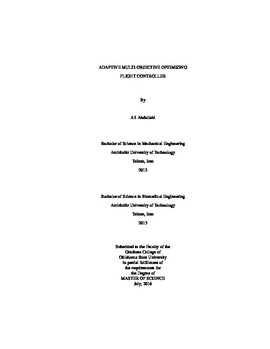| dc.contributor.advisor | Chowdhary, Girish | |
| dc.contributor.author | Abdollahi, Ali | |
| dc.date.accessioned | 2017-02-22T22:13:26Z | |
| dc.date.available | 2017-02-22T22:13:26Z | |
| dc.date.issued | 2016-07-01 | |
| dc.identifier.uri | https://hdl.handle.net/11244/49028 | |
| dc.description.abstract | The problem of synthesizing online optimal flight controllers in the presence of multiple objectives is considered. A hybrid adaptive-optimal control architecture is presented, which is suitable for implementation on systems with fast, nonlinear and uncertain dynamics subject to constraints. The problem is cast as an adaptive Multi-Objective Optimization (MO-Op) flight control problem wherein control policy is sought that attempts to optimize over multiple, sometimes conflicting objectives. A solution strategy utilizing Gaussian Process (GP)-based adaptive-optimal control is presented, in which the system uncertainties are learned with an online updated budgeted GP. The mean of the GP is used to feedback-linearize the system and reference model shaping Model Predictive Control (MPC) is utilized for optimization. To make the MO-Op problem online-realizable, a relaxation strategy that poses some objectives as adaptively updated soft constraints is proposed. The strategy is validated on a nonlinear roll dynamics model with simulated state-dependent flexible-rigid mode interaction. In order to demonstrate low probability of failure in the presence of stochastic uncertainty and state constraints, we can take advantage of chance-constrained programming in Model Predictive Control. The results for the single objective case of chance-constrained MPC is also shown to reflect the low probability of constraint violation in safety critical systems such as aircrafts. Optimizing the system over multiple objectives is only one application of the adapive-optimal controller. Another application we considered using the adaptive-optimal controller setup is to design an architecture capable of adapting to the dynamics of different aerospace platforms. This architecture brings together three key elements, MPC-based reference command shaping, Gaussian Process (GP)-based Bayesian nonparametric Model Reference Adaptive Control (MRAC) which both were used in the previous application as well, and online GP clustering over nonstationary (time-varying) GPs. The key salient feature of our architecture is that not only can it detect changes, but it uses online GP clustering to enable the controller to utilize past learning of similar models to significantly reduce learning transients. Stability of the architecture is argued theoretically and performance is validated empirically. | |
| dc.format | application/pdf | |
| dc.language | en_US | |
| dc.rights | Copyright is held by the author who has granted the Oklahoma State University Library the non-exclusive right to share this material in its institutional repository. Contact Digital Library Services at lib-dls@okstate.edu or 405-744-9161 for the permission policy on the use, reproduction or distribution of this material. | |
| dc.title | Adaptive Multi-objective Optimizing Flight Controller | |
| dc.contributor.committeeMember | Rhinehart, R. Russell | |
| dc.contributor.committeeMember | Bai, He | |
| osu.filename | Abdollahi_okstate_0664M_14719.pdf | |
| osu.accesstype | Open Access | |
| dc.description.department | Mechanical & Aerospace Engineering | |
| dc.type.genre | Thesis | |
| dc.type.material | text | |
